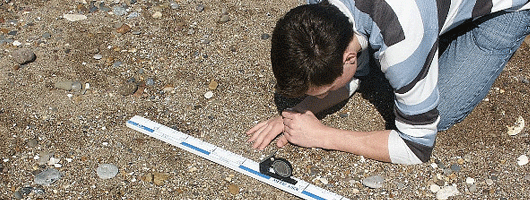 Geology | GEOL
Geology | GEOL
P Prerequisite | C Co-requisite | R Recommended
I Fall Semester | II Spring Semester | S Summer Session/s
- GEOL-G 100 General Geology (3-5 cr.) Survey of physical geology and introduction to historical geology. Elements of crystallography, mineralogy, petrology, geomorphology, seismology, structural geology, paleontology, historical geology, and plate tectonics. Optional Saturday field trip.
- GEOL-G 102 Introduction to Earth Science Laboratory (1 cr.) Classification and identification of minerals, rocks, and fossils. Weather and climates. Map projections, maps, and local topography. Geology of Indiana.
- GEOL-G 107 Earth and Our Environment (3 cr.) An introduction to geology through discussion of geological topics that show the influence of geology on modern society. Topics include mineral and energy resources, water resources, geologic hazards and problems, geology and health, and land use.
- GEOL-G 111 Physical Geology (3 cr.) P: An ALEKS score of 31 or greater, or equivalent. Basic concepts of geology. Geological time, formation of rocks; erosion and landscape evolution. Interpretation of earth history from geological data. Saturday field trips. I
- GEOL-G 112 Historical Geology (3 cr.) P: An ALEKS score of 31 or greater, or equivalent. Principles of interpreting earth history from geological data. Geologic time, biological evolution, plate tectonics, and ancient environments. II
- GEOL-G 185 Global Environmental Change (3 cr.) The scientific basis behind natural and human-based global environmental changes. Geological perspective of the formation of the earth. Human activities influencing the natural system, including population, deforestation, water usage, acid rain, ozone depletion, smog and global warming. Subsequent human reactions.
- GEOL-G 210 Oceonography (3 cr.) P: An ALEKS score of 31 or greater, or equivalent. An introduction to the study of oceans and marine processes and the atmosphere. Emphasis on the morphology of the ocean floor, life in the ocean, oceanic circulation, sea-floor spreading, global climate, and solar-terrestrial relations. II (odd years)
- GEOL-G 219 Meteology (3 cr.) P: An ALEKS score of 31 or greater, or equivalent. Basic concepts of atmospheric dynamics and meteorology, with emphasis on developing an understanding of weather, climate, and forecasting. II (even years)
- GEOL-G 400 Energy: Sources and Needs (3 cr.) Scientific and political constraints on the production and utilization of energy from various sources energy balance of the United States.
- GEOL-G 451 Principles of Hydrogeology (2-4 cr.) P: C106, M216, or consent of instructor. Physical and chemical properties of water; chemical equilibria and stable isotopes in groundwaters; acid drainage, landfills, and agricultural pollution; Darcy's Law, fluid potential, unsaturated flow; fluid and aquifer properties affecting groundwater flow; fluid mass-balance equation and its application; contaminant transport.
- GEOL-G 476 Climate Change Science (3 cr.) Evidence for and theories of climate change over a range of time scales. Sources of natural climate forcing are presented, historical evolution of climate change is quantified, and model tools and climate projections are presented along with analyses of climate change impacts.
- GEOL-N 190 The Natural World (3 cr.) P: An ALEKS score of 31 or greater, or equivalent. Introduces students to the methods and logic of science, and helps them understand the importance of science to the development of civilization and the contemporary world. Provides a context within which to evaluate the important scientific and technological issues of modern society. Interdisciplinary elements. I, II, S May be repeated for credit.
- GEOL-N 390 The Natural World (3 cr.) P: An ALEKS score of 31 or greater, or equivalent. Explores an important scientific or technological issue in modern society. Applies scientific methods and interdisciplinary perspectives in an examination of the subject. Investigates the broader implications and ethical dimensions of scientific research and technological advancement. I
- GEOL-T 106 Earth and Space Science for Elementary Teachers (4 cr.) P: MATH-T 101 and PHYS-T 105 or CHEM-T 105. Open only to elementary education majors. Principles of earth and space science. Laboratory, demonstration, and exploration enrich the course material and develop the expertise needed for success in the elementary school classroom. I, II